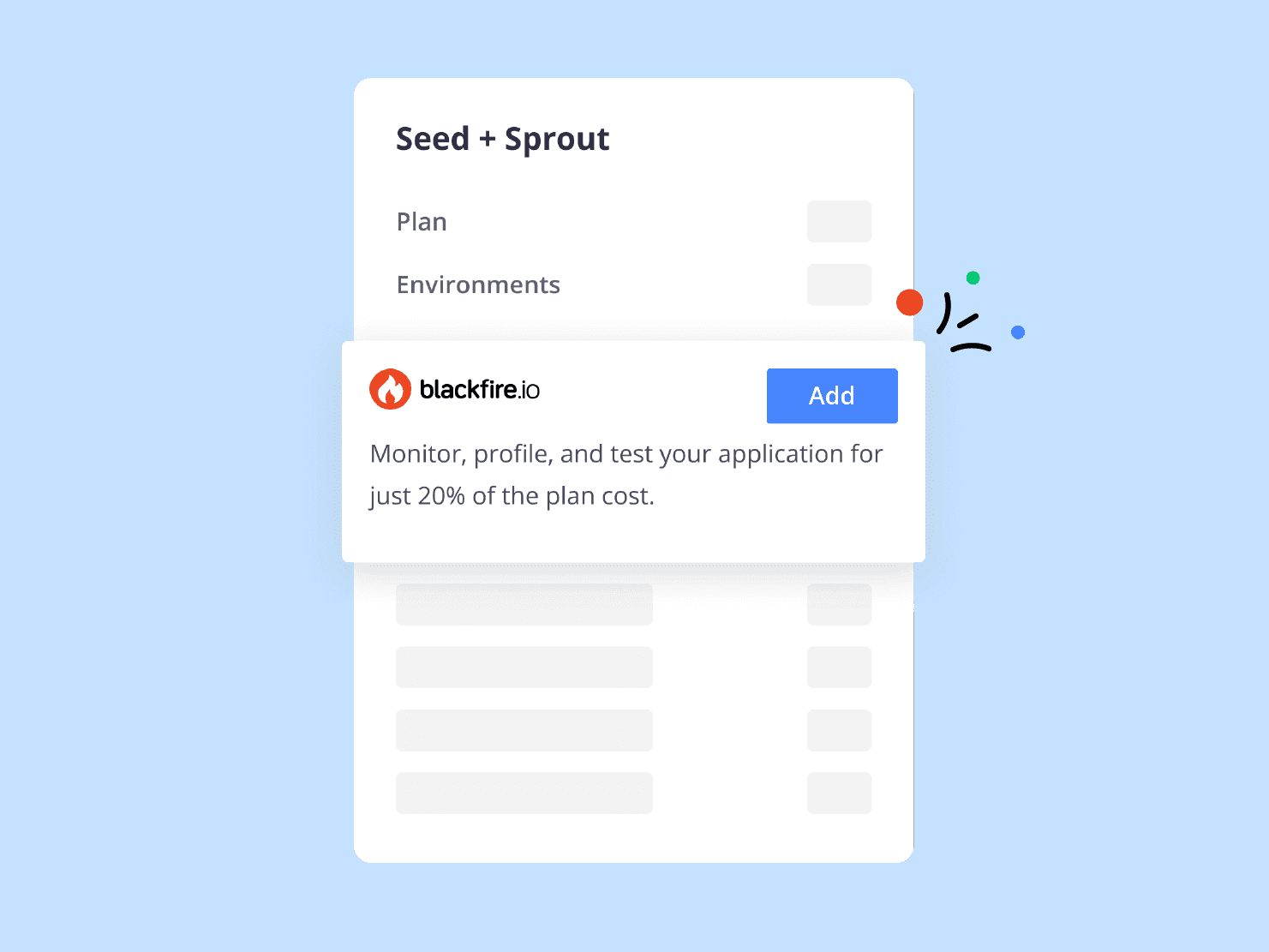First, a joyous and productive 2017 to you all. 2016 was really great for us as a growing company and the new year is a great time to look back and share with you, our dear clients and community, our journey.
The title of the post is audacious, very possibly a hyperbole. There are bigger players than us out there. We don’t claim the highest market share. We claim we have become an obvious choice for ambitious projects. Let me make the case.
Over the course of last year, the leading vendors in the PHP enterprise space Magento, eZ Platform, Typo3, and most recently Symfony - the PHP framework of frameworks - announced their cloud platform to be on Platform.sh. Since its inception two and a half years ago, Platform.sh has already become a leader in the whole PHP space. How did this come about?
Some technologies were born to be great, some have had greatness thrust upon them.
We set out working on Platform.sh with humble ambitions. As a company we were going to solve eCommerce. We believed that Open Source was the way and we believed that the best Open Source platform we could leverage to make an eCommerce solution was Drupal, with its correct mix of wide-spread adoption, code quality and extensibility. This was how Drupal Commerce was born.
We originally built Platform.sh to be the hosted version of this project, with a bunch of unique features that would make it the killer eCommerce service: built-in high-availability, and unmatched development to production workflow. We had to go deep and low for that (when we started the project no one was talking about containers, micro-services or hybrid cloud infrastructures, but we knew it was the way to go.)
To cut a long story short a few short months after presenting Platform.sh to the world the reaction was tremendous. Our clients loved it. But they also quickly asked us… “why can’t we use this for our non-eCommerce Drupal site, what about our Symfony based projects, and Wordpress? And Magento? We use the Akeneo PIM alongside the Magento, and there is a NodeJs based notification service…”.
The 2016 pivot
So like startups do, we pivoted. Commerce Guys has become its own company. And Platform.sh as an independent entity set out to conquer the PaaS market. This happened in the beginning of 2016. We have more than doubled our team since then. We now have people in 10 time zones from the West Coast to the East Coast, from Europe to Asia.
Why keep the PHP focus?
The technology we built was runtime-agnostic. Setting out as an independent company we could very well have shifted our focus from Drupal and PHP. We chose not to.
First a couple of words on the PHP space. There was a moment three or four years ago when there was a widespread perception that PHP was faltering. That it belonged to the realm of legacy, soon to be replaced. Of course, that was before the likes of Slack were born. Before PHP 7.0 went out of the gate. Before Composer took hold. Before Drupal 8.0 was finally released. Before this world started standardizing on Symfony. Today, we know PHP is here to stay, with both its great advantages and its weaknesses. It is powering much of the internet, from Facebook and Wikipedia to the millions and millions of sites running Wordpress and Drupal. It is powering most of online commerce. It is chosen by startups and enterprises alike.
We understood this from the beginning. We understood its importance.
Of course this does not mean we dislike other programming languages and environments. Our team is composed of true polyglots and within it you will find as many people that love functional programming from Lisp addicts to Elixir fans. Both Python and Ruby are loved. Rust is a passion. GoLang highly considered for what it does best. Then there is the herd of C nerds. We even have people that like NodeJS. We really do.
But at the time when PHP seemed to lose its lustre, everybody in the new shiny tools department started building for the new shiny languages. This happened for probably two reasons:
- Shiny people like shiny stuff (and who cares if 80% of the web works with something else).
- Doing PHP right is hard. Harder than the other stuff.
Why is PHP hard? Because of its immense popularity, PHP is more diverse. It is diverse in the number of frameworks, in the number of versions people run, in the quality of code. And because of its execution model, the topologies in which PHP applications may run can vary wildly.
As such we built a lot of flexibility in. We made it build-oriented so we can support any form of project. Unlike all other PaaS providers we added support for non-ephemeral local storage, so you could run even legacy PHP applications and still benefit from the cloud.
As such, we built it for highly-available micro-services architectures. You can get RabbitMQ, MongoDB, Redis, Postgres, Elastic Search, Solr and of course MySQL available in every Cluster. Doing PHP right meant that we also built it so that you can easily migrate from your “Legacy PHP” to this “Modern PHP” world. A world where no one has root access to a production server. A world of automated consistent deployments.
PHP Leadership
It was our mission to make it easy to do PHP right. That is why we built Platform.sh for “Modern PHP” from the beginning. This is also why early on we added NodeJS, Python, Ruby or Java (modern PHP is no longer as island). And we will be adding ever more services and runtimes which won’t make us lesser of a PHP platform, on the contrary it makes us a better one. Those that have specifically built their systems to run Drupal 7.0 with PHP 5.6 find themselves with an aging platform ill-equipped for new requirements, less performant and less agile. But going wide, we have better and more up-to-date support not only for legacy Drupal and PHP, but also for everything new that is coming. Count on us to be the best Drupal 9.0 hosting service; the best Symfony 4.0 one. The coolest Magento 3.0.
Appreciating this mindset and impressed by our technology, major PHP folks also joined us. We announced the arrival of Larry Garfield, AKA Crell, as our DevEx director and Sara Golemon, of HHVM fame, left Facebook in San Francisco to join our R&D team. Sandro Groganz, a true PHP community veteran joined us just last week to work shore-up our marketing automation team. These people complement our foundation team, that includes people like Robert Douglass and Damien Tournoud. This is how serious we were about investing in PHP by recruiting the best of talents.
In return, we saw how seriously the PHP world is taking us. As early as February 2016, Magento announced their flagship product Magento Enterprise Cloud Edition as a white-label of Platform.sh. Early December, it was announced that the Symfony cloud platform Sensio.Cloud is using Platform.sh as well. In between, we signed deals with TYPO3 community and eZ Systems.
All the while, hundreds of Drupal and Drupal Commerce, Wordpress and custom PHP sites launch every week on Platform.sh. And we are getting more and more people that deploy multi-app and micro-services oriented architectures (with more and more NodeJS, Python and Ruby apps in there as well).
PHP is here to stay, and we are here to make it run
Over the last days of 2016 and the first of 2017 we announced PHP 7.1 support as well as Private Packagist support, and today we can announce HTTP/2 active by default on all projects. Making all the fastness even faster. You can fully expect even more incredible features to be coming your way. We mean to keep on being the best Drupal and the best PHP hosting platform. Stay posted.
 Switching to Platform.sh can help IT/DevOps organizations drive 219% ROI
Switching to Platform.sh can help IT/DevOps organizations drive 219% ROI Organizations, the ultimate way to manage your users and projects
Organizations, the ultimate way to manage your users and projects




